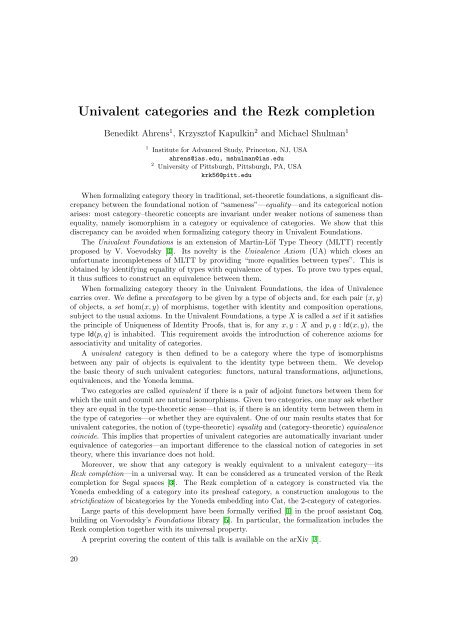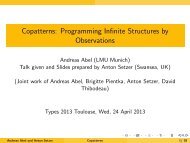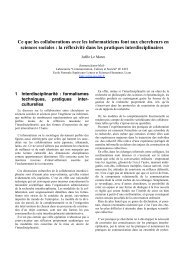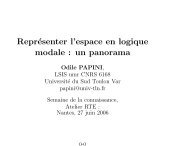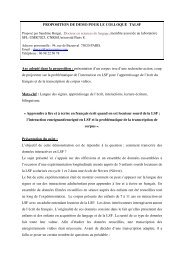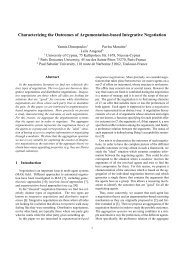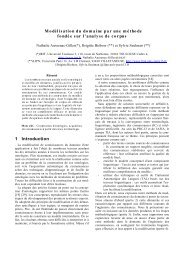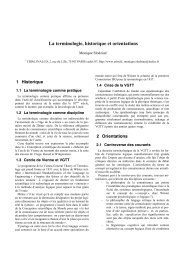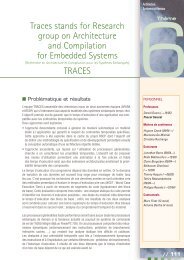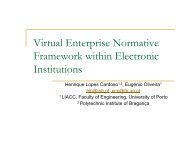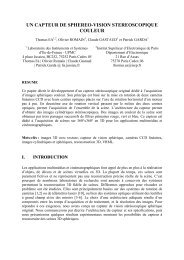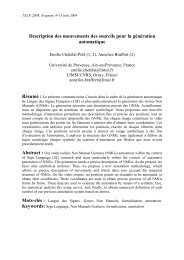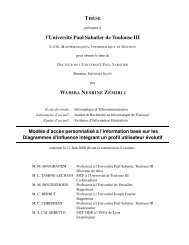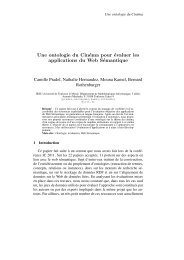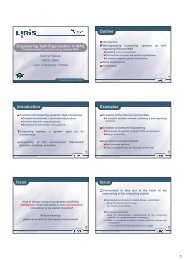Book of Abstracts - IRIT
Book of Abstracts - IRIT
Book of Abstracts - IRIT
You also want an ePaper? Increase the reach of your titles
YUMPU automatically turns print PDFs into web optimized ePapers that Google loves.
Univalent categories and the Rezk completion<br />
Benedikt Ahrens 1 , Krzyszt<strong>of</strong> Kapulkin 2 and Michael Shulman 1<br />
1 Institute for Advanced Study, Princeton, NJ, USA<br />
ahrens@ias.edu, mshulman@ias.edu<br />
2 University <strong>of</strong> Pittsburgh, Pittsburgh, PA, USA<br />
krk56@pitt.edu<br />
When formalizing category theory in traditional, set-theoretic foundations, a significant discrepancy<br />
between the foundational notion <strong>of</strong> “sameness”—equality—and its categorical notion<br />
arises: most category–theoretic concepts are invariant under weaker notions <strong>of</strong> sameness than<br />
equality, namely isomorphism in a category or equivalence <strong>of</strong> categories. We show that this<br />
discrepancy can be avoided when formalizing category theory in Univalent Foundations.<br />
The Univalent Foundations is an extension <strong>of</strong> Martin-Löf Type Theory (MLTT) recently<br />
proposed by V. Voevodsky [4]. Its novelty is the Univalence Axiom (UA) which closes an<br />
unfortunate incompleteness <strong>of</strong> MLTT by providing “more equalities between types”. This is<br />
obtained by identifying equality <strong>of</strong> types with equivalence <strong>of</strong> types. To prove two types equal,<br />
it thus suffices to construct an equivalence between them.<br />
When formalizing category theory in the Univalent Foundations, the idea <strong>of</strong> Univalence<br />
carries over. We define a precategory to be given by a type <strong>of</strong> objects and, for each pair (x, y)<br />
<strong>of</strong> objects, a set hom(x, y) <strong>of</strong> morphisms, together with identity and composition operations,<br />
subject to the usual axioms. In the Univalent Foundations, a type X is called a set if it satisfies<br />
the principle <strong>of</strong> Uniqueness <strong>of</strong> Identity Pro<strong>of</strong>s, that is, for any x, y : X and p, q : Id(x, y), the<br />
type Id(p, q) is inhabited. This requirement avoids the introduction <strong>of</strong> coherence axioms for<br />
associativity and unitality <strong>of</strong> categories.<br />
A univalent category is then defined to be a category where the type <strong>of</strong> isomorphisms<br />
between any pair <strong>of</strong> objects is equivalent to the identity type between them. We develop<br />
the basic theory <strong>of</strong> such univalent categories: functors, natural transformations, adjunctions,<br />
equivalences, and the Yoneda lemma.<br />
Two categories are called equivalent if there is a pair <strong>of</strong> adjoint functors between them for<br />
which the unit and counit are natural isomorphisms. Given two categories, one may ask whether<br />
they are equal in the type-theoretic sense—that is, if there is an identity term between them in<br />
the type <strong>of</strong> categories—or whether they are equivalent. One <strong>of</strong> our main results states that for<br />
univalent categories, the notion <strong>of</strong> (type-theoretic) equality and (category-theoretic) equivalence<br />
coincide. This implies that properties <strong>of</strong> univalent categories are automatically invariant under<br />
equivalence <strong>of</strong> categories—an important difference to the classical notion <strong>of</strong> categories in set<br />
theory, where this invariance does not hold.<br />
Moreover, we show that any category is weakly equivalent to a univalent category—its<br />
Rezk completion—in a universal way. It can be considered as a truncated version <strong>of</strong> the Rezk<br />
completion for Segal spaces [3]. The Rezk completion <strong>of</strong> a category is constructed via the<br />
Yoneda embedding <strong>of</strong> a category into its presheaf category, a construction analogous to the<br />
strictification <strong>of</strong> bicategories by the Yoneda embedding into Cat, the 2-category <strong>of</strong> categories.<br />
Large parts <strong>of</strong> this development have been formally verified [1] in the pro<strong>of</strong> assistant Coq,<br />
building on Voevodsky’s Foundations library [5]. In particular, the formalization includes the<br />
Rezk completion together with its universal property.<br />
A preprint covering the content <strong>of</strong> this talk is available on the arXiv [2].<br />
20


